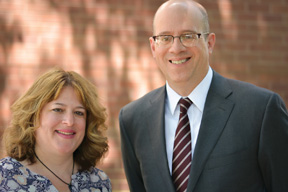
The adage that experience is the best teacher makes a lot of sense to Kansas City-area natives Diane Lowenthal and Jeffrey Sosland.
Lowenthal is senior associate dean of the School of Professional & Extended Studies at American University in Washington, D.C. Sosland is an assistant professor in the School’s Washington Semester Program | Global Economics and Business.
Their second research collaboration paid off: Lowenthal and Sosland won the 2019 National Society for Experiential Education Outstanding Experiential Education Research Award for their article titled “The Forgotten Educator: Experiential Learning’s Internship Supervisor,” published in the Journal of Political Science Education online in mid-2016 and in print the following year. (Read an abstract of the article at bit.ly/2m5VUuR.)
The word “intern” derives from the Latin word “internus,” which means “inside.” That’s where interns go: inside places where they can gain hands-on experience in their fields of study. Lowenthal and Sosland study that process, the roles played by internship supervisors in the workplace and the effects of their work in that regard.
Sosland and Lowenthal have taught a professional course in the Washington Semester program for students who split their time between the classroom and the work world for the academic credits. While teaching the course, they found that research existed about students as interns “but what’s missing is research about the internship boss (on the job),” Sosland said.
“There’s not good research about that individual,” he said. “That internship supervisor evaluates the intern’s performance for part of the grade.”
Through their research, they asked and answered a basic question, among others, about internship supervisors, Sosland said.
“Are they good educators? We found that they were,” he said. “They really do care about the students. This stereotype of the abuse of the intern, taking advantage and exploiting — we found the opposite. On average, these internship supervisors really do care deeply, and that’s what we found in our research.”
The award recognizes “the most important research that’s been done in the field of experiential education,” Lowenthal said, and it’s not given every year but only when research is deemed to merit it. Their research for the article is based on answers provided by 86 respondents — internship supervisors — to 343 survey requests, which Lowenthal said was “considered a pretty decent response rate for this type of research” and was statistically significant. They conducted follow-up focus groups with colleagues who taught in the program “to dig a little deeper and (confirm) the results,” Sosland said.
The article is the second one the two have collaborated on in a related subject. The first explored the effect of doing an internship in Washington and found that, after students did an internship there and then returned to their schools, their academic performance improved.
The award is important to Lowenthal, she said, because “a lot of times with academic research the audience is small (and) the amount of work that goes into it and the payoff is imbalanced.”
“We don’t do the research to get famous or anything like that, but we do want the takeaway to be exposed more broadly so people can learn from the work we’ve done,” she said. “(The award) gives an opportunity for … students and supervisors to learn the roles they have and how to make the most of the situation.”
Lowenthal and Sosland plan to collaborate on additional research papers involving experiential learning.
“We care about academic research, but we also care about good teaching, students learning in the classrooms and various useful ways of teaching and learning,” he said.
Sosland did an internship while in college. Lowenthal didn’t, and she tells her students often that she’s envious of the internship opportunities they have, she said.
Their connections with each other go back to childhood. They both were born at the old Menorah Hospital in Kansas City, Missouri; they both went to Congregation Beth Shalom as children; and they both attended the same summer camp. Sosland graduated from Hyman Brand Hebrew Academy, and Lowenthal graduated from Center High School.
His parents are Blanche and Neil Sosland, who live in Kansas City part of the year. He also has four siblings: Abbey, who lives in Boston; and Debbie Sosland-Edelman, Josh Sosland and David Sosland, all of whom live in the Kansas City area. Her family lives in Chicago, including her mother, Evelyn Lowenthal, who lived in Kansas City until about age 70.
Sosland met his wife, Mindy, at camp when she was 12 and he was 13. Lowenthal met her a year earlier.
Sosland’s mother was a professor of education at Park College (now Park University) in Parkville, Missouri. She influenced their decision to collaborate on their first research project. He was telling his mother about the program he and Lowenthal were involved. She told him: “It’s great you think this is so interesting; you should do some research on it so other people can find out about it.”
Sosland said he was thinking recently about his and Lowenthal’s Kansas City roots. They’re both involved in synagogues in the Washington area, and their children go to Jewish sleep-away camps.
“A lot of the experiences we had in Kansas City are still a big part of our lives and our families,” he said.
They both are “passionate about experiential learning and its value,” he said. The award is important to them because “as academics, we feel strongly that there should be better research out there to support the value of experiential learning. … It’s a lifelong passion that we both feel is really important and has been an important part of our careers.”


